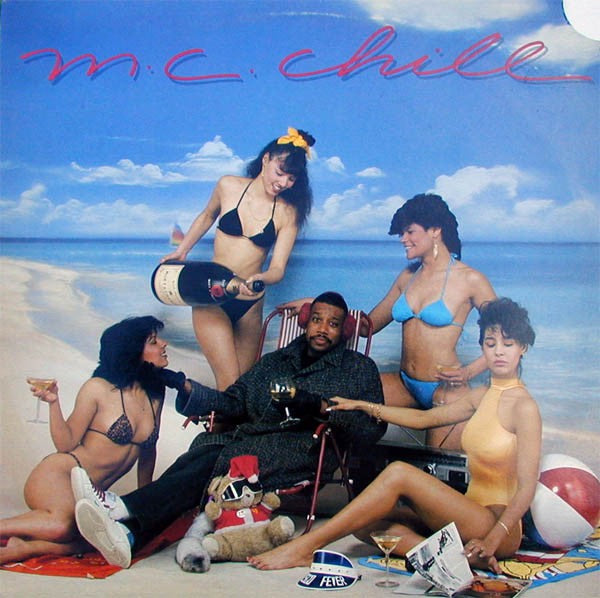Article written by @jdfromcle
The first time Kevin Heard discovered Hip Hop was at a house party. The song was “Rapper’s Delight” by The Sugar Hill Gang and the year was 1980. Heard didn’t know it, but he was listening to the first ripple of a cultural wave that would change music forever. As time went on this new and electrifying sound put a spell on Heard, just as it eventually would for young minds across the world. His fascination would ultimately lead him down the path of becoming MC Chill, Cleveland’s first national rap act.

The Birth of Cleveland’s Hip Hop Scene
In the beginning, there were no Rap stations, Hip Hop clubs, and definitely no rappers. Cleveland, much like other places outside of the late 70s’ Bronx, was breathing Disco’s last breath and singing sweet sounds of R&B. Hip Hop singles from New York started to appear in local record stores, inspiring an unknown MC Chill and his college-age friends to form a rap group known as the “The Bomb Squad”. Other members of the group included DJ Finesse, Wayne G, and DJ Cochise- one of the fathers of Cleveland Hip Hop alongside MC Chill and DJ Johnny O. Cochise was a regular DJ for parties at Kent State, where he exclusively chose to play rap music. According to his own autobiography, it was an act that led some partygoers to heckle or even walk out at the time. Nevertheless, Cochise persisted to play the music he loved weekend after weekend, eventually shifting the opinion of rap on campus. As time went on, Cochise began to experiment with volume changes and developed a DJing style built around the skill we now refer to as scratching. In the Fall of 1981, WDMT FM 108 hosted a massive live-on-air DJ battle called "The Showdown". The favorite to win was the well-known Bud McFarlin, the smoothest mixer while blending two records. Everyone who had entered the contest was a club-style DJ with residencies at local venues- all except for an unknown DJ Cochise. On the day of the battle, Cochise scratched Hip Hop records live on the air and performed a solo rap while 1 million listeners across Northeast Ohio and beyond tuned in. According to MC Chill, this made the city go crazy. “There were no citywide known Hip Hop DJs in town back then” Chill explains. “Cleveland’s Hip Hop scene started the day Cochise won the club style Showdown.” After the battle, Cochise was awarded a trophy along with his own show making him a local celebrity overnight. As a result of this, “The Bomb Squad” was now being referred to as “Cochise and The Bomb Squad”, a change that didn’t exactly sit well with competitive crew member DJ Finesse. “There are people who would say Finesse was a better DJ than Cochise, but I’ll just let them sort that out.” Chill jokes. The group would continue to perform for parties and weekend radio slots until eventually running its course. One thing, however, will always be for certain; The Bomb Squad was the first supreme rap group on Cleveland radio. After the Showdown, MC Chill saw Cleveland become a hip-hop community. WDMT began letting local DJs spin Hip Hop records on weekends during The Club Style Show. This platform would become the very foundation of Cleveland’s Hip Hop scene. “Kids were running around the station acting crazy, some smoking or drinking.” says Chill. “Why the owner let black teenagers do whatever the hell they wanted to do on his top-rated FM station, I don’t know.” “I’m glad he did though.”The Rise of MC Chill
By 1984, there were still no major hip hop records from Cleveland. The focus for most DJs was to simply grow the size of the parties. Once emcees joined the spotlight the reward was whatever money the DJ handed them; fifty dollars on a good night. Creating a full on Hip Hop record hadn’t been done and no one local knew how to do it. “You might be on the tape rocking rhymes, but as far as songs that got play elsewhere- that was just something that didn’t happen.” says MC Chill. Chill reached a point where he wanted this to change. Riding the wave of his local success, he connected with regional recording studio Plumplace Records founded by the late Jimmy Stephens and became the first Cleveland rapper with a record deal. Chill was introduced to Plumplace by a friend named Red, a bold character who had worked alongside The O’Jays. He posed a question to Chill that would raise eyebrows today. “Who's in charge of this rap shit?” Chill’s best guess in 1984 was Russell Simmons. As bizarre as it sounds, the two men opened a phone book and placed a call to a newly founded Def Jam Recordings. It was so early in the evolution of Hip Hop that a young LL Cool J answered the phone. After speaking to a few people, including Russell himself, it became clear that Chill needed to make a Demo. “You need a producer to make a record and back then no one had beats.” Chill explains. “You might be able to use a loop, or have some early drum program but there were no Cleveland hip hop producers in 1984.” Mike Chapman was the only person Chill knew of that might be able to help. He was a student at Ohio State who had just created a techno style song and the closest thing they had to a hip hop producer. Red and Chill rented a car and drove down to OSU with nothing but a name in hand. “That was just the kind of guy Red was” says Chill. “We just walked around campus asking people if they knew Mike Chapman and eventually found him in the freshman dorm.” Once Chapman had agreed to provide them with tracks, it was eventually time to record. The group soon realized recording studios in the area had no idea how to work with Hip Hop artists. Chill had even brought a beatboxer to the studio which complicated things further. After a bit of trial and error, Chill successfully managed to record enough songs for a demo. Not long after that, fate stepped in. Chill received a phone call from Chapman who had started working at WDMT. He was currently on his way to the airport to pick up Mr.Magic, a DJ from New York known for pioneering the Hip Hop radio show format. Mr.Magic’s show would help popularize acts such as Big Daddy Kane and Biz Markie. Chapman, seeing this as an opportunity, suggested Chill tag along for the ride. A few moments after Mr.Magic had entered the car, Chapman played Chill’s demo. When it came to rap music in the 1980s, Mr.Magic had heard it all. Upon hearing the demo, Magic’s first reaction (“Who the hell is this?”) was quickly followed by another major question- one aimed at Chill. “You got a record deal?” Chill immediately told him no. Technically, he was still signed to Plumplace Records, but a deal from New York was an offer you couldn’t refuse. Chapman’s plan proved to be a success and MC Chill would later receive a call asking him to sign to Fever Records. “At the time I got signed the movie Krush Groove had just come out.” says Chill. “The whole movie they’re trying to get to Club Fever for a record deal and meanwhile I’m signing with the label.” Chill had become a celebrity in Cleveland but upon his arrival to New York he encountered prejudice from his east coast labelmates. Hip Hop icon Lovebug Starski had recently parted ways with Fever so New Yorkers raised eyebrows at the idea of trading him for a guy from Cleveland. “When I told people I was from Cleveland, they asked if that was a street in the Bronx.” notes Chill. Chill silenced critics with his first song out the gate. “Bust This Rhyme” would peak at #70 on the Billboard Top 100. At the time, there was no such thing as the Rap 100. MC Chill was on the same chart as Whitney Houston. Following this success, he would go on to perform shows with acts like LL Cool J, Whodini, The Beastie Boys, and more. MC Chill had officially become the first non-coastal rapper to make a nationally recognized hit. “To say you wanted to make a record in an art form that was so dominated by one area was one thing, but to actually do it was another.”The Melle Mel Story
MC Chill refers to himself as a four-song one-hit wonder. “The hit is a different song depending on the person and they usually only remember one or two.” Chill explains. To some, that one-hit is “Bust this rhyme”, the song that put MC Chill highest on the charts. Others will tell you it’s “Prophecy” or “Nightmare on Chill Street”. According to Chill, his greatest mark on Hip Hop history is a record titled “M.C. Story”. During its inception, the song featured a section left open for a feature. Chill was pleasantly surprised to learn his label had the connections to recruit Hip Hop legend Melle Mel for this role- but there was a catch. The label insisted he write Melle Mel’s verse in order to avoid paying out royalty fees. The request seemed absurd to Chill who considered Melle Mel to be the greatest rhyme writer in Hip Hop history. Mel’s lyrics had been immortalized on early Hip Hop classics such as “The Message”, a song challenging established ideas of what emcees could rap about. Unable to pass up the opportunity, Chill decided he would give his best attempt at writing the verse. “I listened to ‘Beatstreet’ a billion times, I played ‘The Message’ a million times, I listened to all his old cuts- I was channelling Melle Mel.” Chill asserts. Eventually, Chill managed to write a 12-bar verse he was confident would do Mel justice. He made his way to the historical Quad Recording Studios, the same one Tupac would be shot in years later. Melle Mel soon arrived in his signature attire complete with fringes on his arms and buckles on his body. In the eyes of MC Chill, he appeared larger than life. However, this dream was on the verge of becoming a nightmare. It soon became clear no one had informed Melle Mel he wouldn’t be writing his own lyrics. Chill was now recalling the bad feeling he had about this situation in the first place. When the room pointed Melle Mel to the person who wrote his verse his response left Chill speechless. “You’ve got to be fucking kidding me.” said Mel. Just as things were starting to fall apart, Mike Chapman suggested Melle Mel at least listen to the track. The song came on and Chill’s voice boomed from the speakers. I wrote this story not just for me But for those who long to become emcees. For those who know and who understand How good it feels with a mic in ya hand When the song was over Melle Mel asked to see what Chill wrote for him. He took the legal pad, asked for a pen, and changed one line at the very end of the verse. He replaced “I go by Grandmaster Melly Mell” with “I go by the code of Melly Mell”. “He said verbatim what I wrote.” says Chill laughingly. “To this day people tell me ‘Melly blessed you with a nice verse’ but I wrote that shit!”



